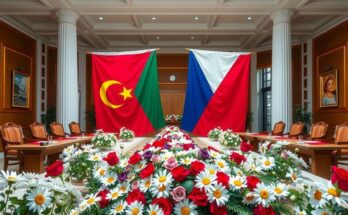The UN Security Council addressed the humanitarian crisis in Goma, DRC, due to violence from M23 rebels and Rwandan troops. Vivian van de Perre called for urgent international action as mass displacements continue and humanitarian conditions worsen. MONUSCO’s resources are strained, necessitating political resolution and humanitarian corridors to safeguard civilians.
The UN Security Council held its second emergency meeting in three days concerning the worsening crisis in Goma, the eastern Democratic Republic of the Congo (DRC) capital. Vivian van de Perre, the Deputy Head of the UN Stabilization Mission in the DRC (MONUSCO), provided alarming updates on the humanitarian plight and urgently requested international intervention to halt the hostilities between the Rwanda-supported M23 rebels and Congolese forces competing for control of the city.
The recent skirmishes have caused significant displacement, with more than 178,000 individuals fleeing the Kalehe territory due to the M23’s seizure of Minova. Over 34,000 displaced persons have sought refuge in already overcrowded IDP sites near Goma, exacerbating the dire humanitarian conditions and stressing the city’s infrastructure further.
Despite previous appeals for peace from Member States, the M23 and Rwandan Defense Force (RDF) launched an aggressive offensive on Goma, employing heavy artillery and resulting in numerous civilian injuries and additional displacements. Ms. van de Perre highlighted the escalating trauma inflicted upon the local populace from these attacks.
The critical role of MONUSCO in providing safety and refuge has become increasingly strained as the mission is overwhelmed by the influx of civilians and surrendering combatants. Approximately 1,200 Congolese soldiers and over a thousand civilians have sought safety at MONUSCO bases, creating severe demands on resources.
Adding to the challenges are the dangers faced by UN personnel, with recent reports of mortar attacks and gunfire targeting MONUSCO camps. With the continued violence, the evacuation of injured peacekeepers remains precarious, even as efforts persist to facilitate medical transport despite Goma airport’s closure.
The M23 and RDF’s occupation of the international airport has raised alarm about potential weapon proliferation as combatants mix with civilians. This situation increases the risk of sexual and gender-related violence, particularly affecting women and children amid the escalating chaos.
In light of the humanitarian catastrophe, Ms. van de Perre asserted the necessity for urgent establishment of humanitarian corridors and the reopening of vital transit points. She emphasized that military solutions are inadequate, advocating for a resumption of the Luanda Process under Angolan mediation as a pathway to de-escalation and to prevent a possible third Congo war.
The call concluded with an urgent plea for coordinated international efforts to address the precarious circumstances in Goma. Nonetheless, MONUSCO continues to serve as a crucial support system for vulnerable groups, although the mission’s capabilities are being severely strained by the ongoing violence and logistical obstacles.
The ongoing crisis in Goma, DRC, has escalated due to armed conflicts involving M23 rebels and Congolese military forces, with reported support from Rwandan troops. The situation has resulted in extensive humanitarian issues, including mass displacements and exacerbated vulnerabilities among civilians, particularly women and children. The UN Security Council’s meetings aim to address this turbulence and strategize effective international responses to restore peace and stability in the region.
In summary, the humanitarian crisis in Goma necessitates immediate and collaborative international intervention to alleviate suffering and restore order. The ongoing violence, aggravated by military confrontations, has disrupted the lives of thousands, calling for robust diplomatic efforts and support systems. MONUSCO’s role remains pivotal, but its capacity is increasingly tested amidst these challenges, underscoring the urgency of a political resolution to foster long-term peace.
Original Source: news.un.org




